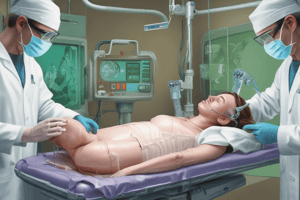Podcast
Questions and Answers
An appendectomy performed for acute, unruptured appendicitis is classified as which type of wound?
An appendectomy performed for acute, unruptured appendicitis is classified as which type of wound?
- Class 3 (contaminated) (correct)
- Class 2 (clean contaminated)
- Class 4 (dirty)
- Class 1 (clean)
During a laser procedure, the disposable paper drapes ignite and begin to burn. What type of extinguisher should be used on this fire?
During a laser procedure, the disposable paper drapes ignite and begin to burn. What type of extinguisher should be used on this fire?
- Class ABC (correct)
- Class B
- Class BC
- Class C
What should the perioperative nurse do to prevent complications in the immediate postoperative period for a patient who just underwent a closed reduction of her fracture radial and ulnar bones under general anesthesia?
What should the perioperative nurse do to prevent complications in the immediate postoperative period for a patient who just underwent a closed reduction of her fracture radial and ulnar bones under general anesthesia?
- Handle cast with fingertips only
- Check fingers for temperature and color (correct)
- Keep arm at same height as fingertips only
- Keep arm covered with blanket to promote cast drying
Which nursing diagnosis is most important for a 49-year-old firefighter with 60% second- and third-degree burns during the intraoperative period?
Which nursing diagnosis is most important for a 49-year-old firefighter with 60% second- and third-degree burns during the intraoperative period?
What is the immediate action the perioperative nurse should take to treat a suspected malignant hyperthermia incident during a laparoscopic cholecystectomy?
What is the immediate action the perioperative nurse should take to treat a suspected malignant hyperthermia incident during a laparoscopic cholecystectomy?
Which preoperative lab result is of most concern for Mr. Smith undergoing a TURP?
Which preoperative lab result is of most concern for Mr. Smith undergoing a TURP?
Which incision would most probably be used for a splenectomy?
Which incision would most probably be used for a splenectomy?
Which outcome standard applies specifically to the pediatric patient?
Which outcome standard applies specifically to the pediatric patient?
Which is NOT an anesthetic inhalation agent?
Which is NOT an anesthetic inhalation agent?
Pressure applied to the cricoid cartilage to occlude the esophagus and prevent vomiting is called the:
Pressure applied to the cricoid cartilage to occlude the esophagus and prevent vomiting is called the:
What is the recommended total amount of lidocaine for a patient undergoing a hernia repair using local anesthesia?
What is the recommended total amount of lidocaine for a patient undergoing a hernia repair using local anesthesia?
When positioning a patient's arm on an armboard, it is important to prevent abduction of the arm at an angle greater than ____ degrees to prevent injury to the ____.
When positioning a patient's arm on an armboard, it is important to prevent abduction of the arm at an angle greater than ____ degrees to prevent injury to the ____.
Flashcards are hidden until you start studying
Study Notes
Surgical Wound Classification
- An appendectomy for acute, unruptured appendicitis is a Class 3 (contaminated) wound.
Fire Extinguisher Use
- Use a Class ABC extinguisher for fires caused by ignited disposable paper drapes during laser procedures.
Postoperative Care for Pediatric Patients
- In the immediate postoperative period, check fingers for temperature and color for complications after closed reduction of fractures.
Fluid and Electrolyte Management
- For a patient with significant burns (60%), monitor for potential fluid and electrolyte imbalance during the intraoperative period.
Malignant Hyperthermia Response
- In suspected malignant hyperthermia, immediately call for the MH cart and Dantrolene when tachycardia, tachypnea, and elevated end-tidal CO2 occur.
Preoperative Lab Concerns
- A potassium level of 2.5 is critical and concerning for a patient undergoing TURP, signaling potential risk for complications.
Surgical Incisions
- The left subcostal incision is most commonly used for splenectomy procedures.
Pediatric Patient Outcome Standards
- Pediatric patients should maintain normothermia, fluid balance, and normal oxygenation, which are all key outcome standards.
Anesthetic Agents
- Succinylcholine is not an inhalation anesthetic agent compared to Halothane, Enflurane, and Nitric oxide.
Airway Management Technique
- Sellick's maneuver involves applying pressure to the cricoid cartilage to occlude the esophagus and prevent vomiting.
Lidocaine Dosage Limits
- The maximum recommended total dosage of lidocaine for local anesthesia should not exceed 350mg.
Arm Positioning Safety
- When positioning a patient's arm, avoid abduction greater than 90 degrees to prevent injury to the brachial plexus.
Lithotomy Positioning
- Slowly lowering the legs from the lithotomy position to supine helps facilitate safe transition and prevent complications.
Studying That Suits You
Use AI to generate personalized quizzes and flashcards to suit your learning preferences.





